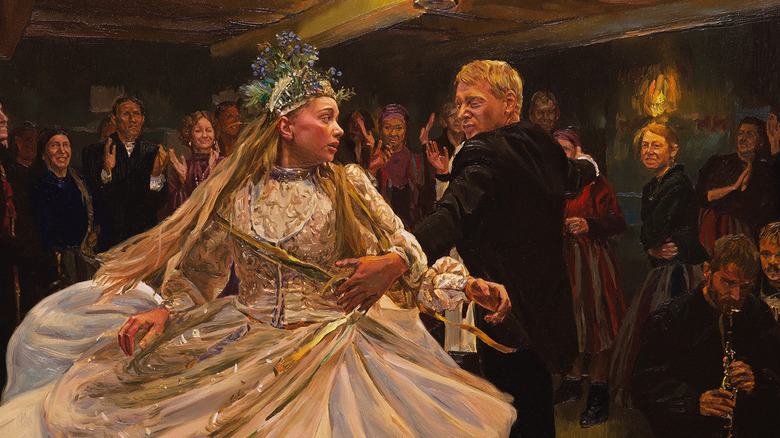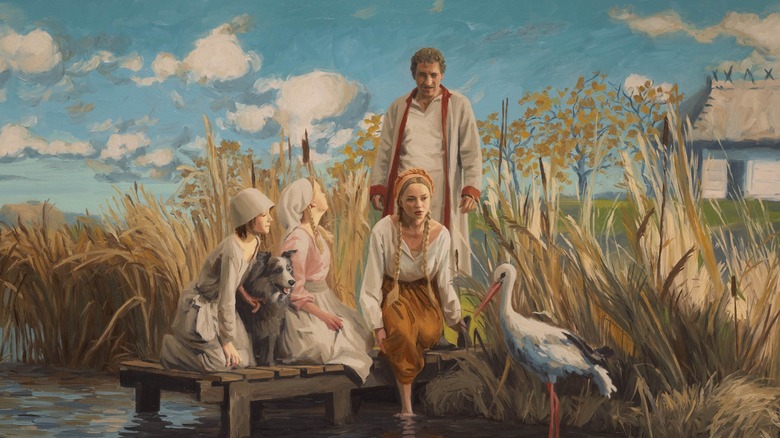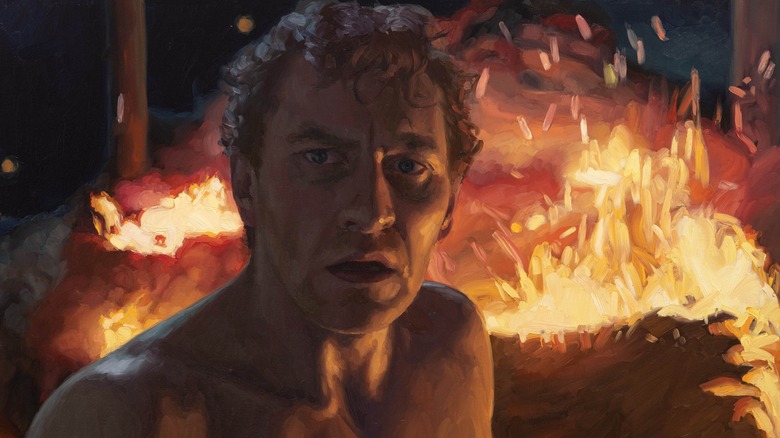The Peasants Review: Beautiful Paintings Of Ugly Brutality
- The painted rotoscoping is an incredible achievement
- Energetic use of Polish folk music
- Some parts can be boring...
- ...while other parts are hard to watch in their brutality
"Loving Vincent," the 2017 arthouse sleeper hit directed by the married duo of D.K. and Hugh Welchman, was a film worth celebrating less by standard metrics of storytelling — it wasn't very good on that front — and more for the fact it existed at all. An animated feature film composed of 12 handmade oil paintings per second in the style of Vincent Van Gogh is one of those feats of artistic craft that's so ambitious it deserves respect, and the final result is so beautiful that it deserves awe.
"The Peasants," the Welchmans' new film that premiered at the 2023 Toronto International Film Festival, is just as stunning an artistic achievement in its own right, though the technical details are slightly different. Whereas "Loving Vincent" is entirely hand-painted, the more realistic paintings in "The Peasants" took twice as long to paint — 5 hours per frame — so they made fewer painted keyframes and used computer animation for in-between frames. It still looks fantastic, and you can take comfort in the fact the filmmakers actively rejected A.I. animation options as not up to their rigorous quality standards.
The film's existence is all the more miraculous in light of the serious obstacles it faced to getting made. Production temporarily shut down due to the COVID-19 pandemic in 2020, struggled through an economic downturn in Eastern Europe, and was nearly dealt a death blow by Vladimir Putin's invasion of the Ukraine. At the film's world premiere at 2023's TIFF, the directors of this multinational production discussed how they helped the Ukranian animators working on the film escape the war. All this is to say that the existence of "The Peasants" is a net good for humanity and, like "Loving Vincent," I just wish the film itself was as thoroughly impressive as the circumstances surrounding its creation.
A literary classic does not guarantee a great film
"The Peasants" is based on a four-part novel by Władysław Reymont, which was published between 1904 and 1909 and won the Nobel Prize in Literature in 1924. Each section of the novel follows a 19th-century peasant village through one of the four seasons — autumn, winter, spring, and summer — and the film adaptation is broken into chapters as such. I haven't read the books, so I can't judge how the movie compares, but apparently anyone in Poland who sees it can answer that question, as the book is widely assigned in their school curriculums.
Having prestigious literary source material as a framework would in theory give this film a leg up over the feeble mystery narrative of "Loving Vincent," but not every great novel necessarily translates to a great film, or at least not without a lot of work done. From both watching the film and from descriptions of the novel, I get the sense that "The Peasants" is at least as much about capturing as many cultural traditions as possible as it is about the central drama. That's certainly valuable in its own right, but I often found myself struggling with the pacing of the film and how repetitive it can be.
There are a lot of dance sequences in the film, and the first time you see one of them, it's mind-blowing. The combination of elaborate crowd movement and the fast-moving camera makes for astonishing imagery you can't believe could be animated, and the traditional Polish folk music delivers a burst of energy that's missing in the story. And then there's another dance scene, and another, and it becomes less and less mind-blowing (though still enjoyable to watch) as it becomes clear the film is repeating the same tricks to grab your attention.
At times, The Peasants is hard to watch
There are a number of characters and subplots throughout "The Peasants," but the main story of interest centers around a young peasant woman named Jagna (Kamila Urzedowska), who's sold into marriage with the much older wealthy farmer (Mirosław Baka) whilst secretly having an affair with his son Antek (Robert Gulaczyk). Both of the men in her life prove violent and abusive in scenes that can be hard to watch — it's no wonder that she eventually wants nothing to do with men.
"The Peasants" might start in autumn and end in summer, but even as the weather gets brighter, the story just gets darker. The climax of the film is an act of violence so brutal and excruciating that I wish there was another act to turn this into a horror-revenge film, but alas, we're in realism territory. The main message of this film is that 19th-century Poland was rough, especially if you were poor, a woman, or both. An accurate message, I'm sure, to the extent that it's an obvious one, and I didn't find myself invested in the story or characters enough to feel like it had much else to offer. But damn, it looks amazing, and that is worth something.
"The Peasants" premiered at the Toronto International Film Festival. Release plans have yet to be announced.


